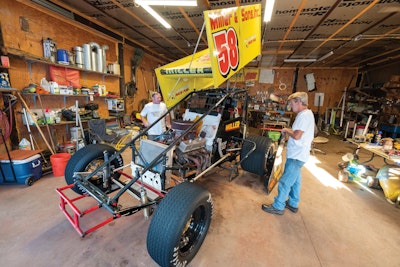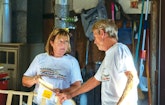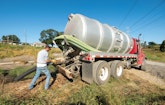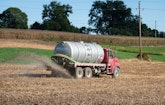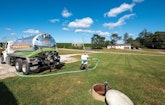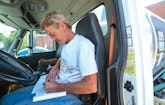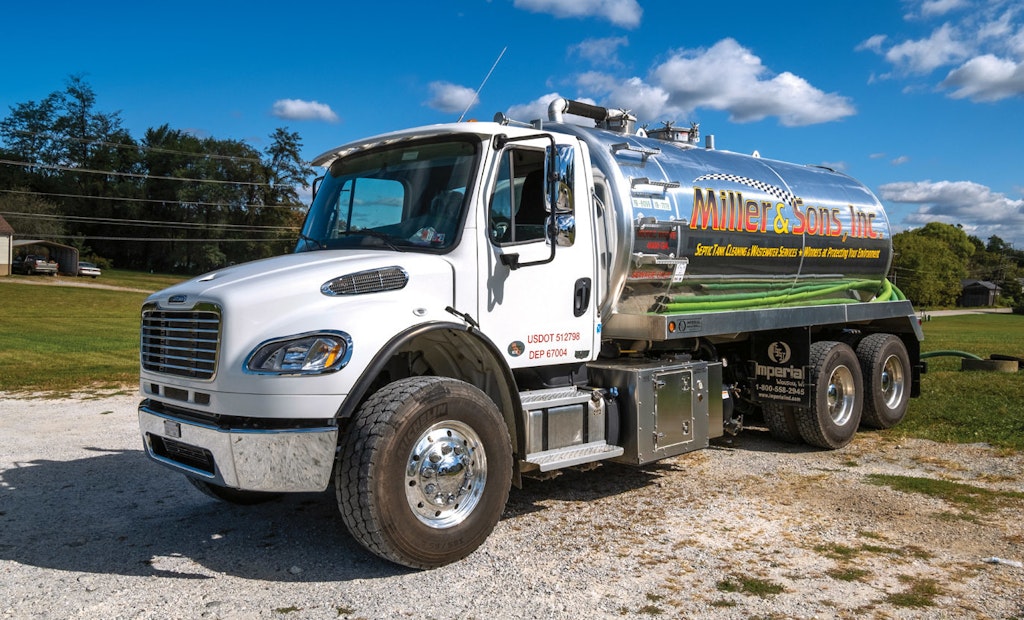
The Dale Miller & Son’s newest vacuum truck from Imperial Industries carries professional graphics with an environmental message. (Photos by Kevin Blackburn)
Dale Miller & Son in Fawn Grove, Pennsylvania, started out small, then grew quite a bit for an independent pumping company. These days, the owners of the family outfit are content to be smaller.
“We’re kind of scaling back a little bit,” says Mike Miller, son of the founder. Miller turns 65 this year and is thinking of taking more time off in the future. It’s a common situation as many pumpers are getting older and finding it difficult to attract good workers to help out.
“I’d like to slow down and get control of how much I work,” he says. “I can’t see myself retiring. I’m not going to sit around and watch TV. You’ve got to do something. I’ll probably continue to work, but I would like to slow down.”
The late Dale Miller was a plumber, in business with his brother, and he bought a vacuum truck as a sideline for the plumbing business in 1971. Mike was in high school at the time, and he and his dad would do the pumping work in the evenings.
The company grew and at one point had seven full-time employees, three part-time employees and an inventory of portable restrooms. But now Dale Miller & Son is down to three full-time drivers, three part-time drivers and an office manager. The office manager and part owner is Mike’s wife, Susan Glackin Miller.
ADDING PORTABLE SANITATION
It was unusually easy for Dale Miller & Son to get involved in the portable restroom business: A big customer came knocking on the door.
“We have a nuclear plant near us. Someone there approached us and asked us to provide toilets,” Susan says. “That’s how we got in it, by request.” The Peach Bottom Atomic Power Station in nearby Delta would have regular partial shutdowns for maintenance that would require a lot of temporary help.
“They bring in a ton of people. They would have (about) 40 restrooms down there for however long the shutdown ran,” Susan says. “All the different trades would come in. It’s a big thing.”
That was the beginning of their portable restroom business, and it grew. At its high point, the company was running 200 to 300 portable restrooms.
“We were always at capacity. We had as many as we could handle,” Susan says. “Our sons, Jared and Paul, ran it in the summer. The boys were out of school and we had some part-time guys.” After Paul went to Penn State and Jared went to York Technical Institute, the company gradually let the portable restroom side of the business get smaller.
“Help is really a big problem around here. We just slowly started not replacing trucks,” she says.
One day someone came into the office to ask about a used restroom service truck that Dale Miller & Son was advertising for sale, and Susan asked him if he’d be interested in buying the whole business. He was, and that was the end of the portable restroom side of the company.
CRASH TAKES TOLL
Another factor in downsizing the business was a tragic traffic accident that put a strain on the company, economically and emotionally. On April 30, 2018, a driver hauling a fully loaded 5,500-gallon vacuum truck was hit head-on by another truck that crossed the centerline. Four men in the other truck died in the crash. The Dale Miller & Son driver has not been able to return to work since the accident, and the company has not been able to replace the truck, which was its largest.
“You never get the amount of money you had in the truck,” Susan says. “We bought another 4,000-gallon truck.” The loss of the larger truck and the driver ended up costing the company some commercial business. Not having the bigger truck made some jobs uneconomical for them to do, and the company was also down a driver.
“That was our only big truck, and that was our driver who drove the big truck. Replacing a driver is very hard to do,” she says.
The newest truck in the Dale Miller & Son fleet is a 2019 Freightliner with a 4,000-gallon aluminum tank and National Vacuum Equipment 4307 blower outfitted by Imperial Industries. The company also has a 2013 International 7500 with a 4,000-gallon aluminum tank and NVE Challenger 866 pump, as well as a 2005 Sterling with a 2,500-gallon aluminum tank and Masport pump. The oldest truck in the fleet is a 1998 Sterling with a 4,000-gallon aluminum tank and Fruitland pump. Dale Miller & Son built that truck in-house. The company also uses a Case CX25 mini-excavator.
LIMITED DISPOSAL OPTIONS
Dale Miller & Son still does a lot of municipal and commercial work, some hauling of leachate from landfills and manure spreading for farmers, as well as residential pumping. The company keeps its service area tight, about a 25 mile-radius from Fawn Grove, which is close to the Pennsylvania-Maryland border.
“We drive farther to dump than we would to service customers,” Susan says. “For us, we have to scramble to find places to dump. It’s a huge issue for pumpers.”
The dump sites are the Springettsbury Township Wastewater Treatment Facility in Pennsylvania and the Sod Run Wastewater Treatment Plant, a county-run facility in Perryman, Maryland.
Tighter regulations in the Chesapeake Bay watershed prompted many of the smaller wastewater treatment plants in the area to refuse to accept septage.
“When the Chesapeake Bay regulations came in, they all had to do upgrades. They had stricter levels. It’s probably been 10 years since we dumped at smaller plants,” Susan explains. “Now we don’t have a lot of options. A few haulers up here land-apply, but we don’t have a big enough farm.”
Every load the company takes to the Springettsbury facility is tested. “The charge varies with the test,” Susan says. “There is a huge difference in what we pay depending on the test.”
A POSITIVE NOTE
Regulations have had a positive effect on the septic hauling business by putting more emphasis on septic system maintenance. “A lot of townships around here are going to mandatory pumping. They have what are called sewage on-lot management programs. Some require pumping every three, every four or every five years,” Susan says.
It’s good for pumpers, but it also makes them take the brunt of criticism from property owners over government interference. “People call and complain that they don’t want the government to come in and inspect their systems. A lot of times we’re the front lines,” she says.
The Millers usually tell customers it’s a lot cheaper to have their tanks pumped every few years than to go on public sewers, which is what might be required if enough older septic systems fail. “I tell them to call one of their neighbors who is on a public sewer and then tell me it’s not cheaper to pump your tank every three, four or five years,” Susan says. “We’re big proponents of on-lot septic here.”
Dale Miller & Son has been providing septic pumping services since 1971, so it’s not surprising that repeat customers provide the bulk of the business for a company that’s been pumping tanks for nearly 50 years.
“It’s mostly repeat customers and word-of-mouth,” Susan says. “I’ve got a database of all our customers. We send out reminder cards. We have a Facebook page. We have a website. We have a little ad in our tiny local newspaper. We still have an ad in the phone book.”
She thinks the reminder cards and the company’s reputation are the best marketing tools. They get a lot of calls from real estate agents because houses with septic systems need to be inspected before they are sold. “The real estate market lately has been pretty busy. We do a fair number of real estate inspections,” she says.
CHANGE HAPPENS
One part of their business that is in decline is manure spreading for local farmers.
“We did a lot of that, but that’s changed over the years,” says Mike, who has a state certification for spreading manure. “We used to have farmers who emptied their pits every two months because that’s all their pits would hold, so you’d be going back to that same farm every two months.
“On most of these new farms, the pits hold six months. That means everyone wants to be done in the spring and the fall, and it’s weather-dependent. You couldn’t get to them all in a timely manner. We couldn’t do what we used to do, and for a while I couldn’t find help,” he says.
Scaling back that part of the business is OK with Mike. He thinks the business was probably most rewarding when it was smaller. “I think when it was just my father and myself, we made more money and had more time off,” he concludes.
Growth meant maintaining more equipment, which is mostly done in-house.
“At one point we had seven full-time employees (plus family members), and every night it was a flat tire or something needed to be fixed. It was problematic,” he says. “I’m not saying we didn’t do well at that point, but we worked a lot more hours. You had to have the truck ready to go for the next day. When someone came in with a flat tire or a busted radiator hose, we tried to get it fixed that night.”
Mike expects his son Jared, 40, will eventually take over. He has continued working for the company since high school. His other son, Paul, who also lives in the area, works as a mechanical engineer for the local power utility. Daughter Michelle, who worked in the office during high school, went to Bucknell University and worked as a project engineer before becoming a stay-at-home mom.
Mike looks back on his career with satisfaction.
“We worked hard, but we made money. There’s a lot of satisfaction to it,” he says. “I’m tired of working 12-hour days, 14-hour days. I’m going to keep working, but hopefully I can schedule a few more days off.”
